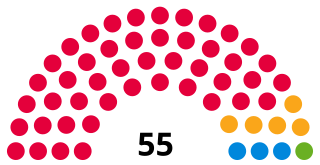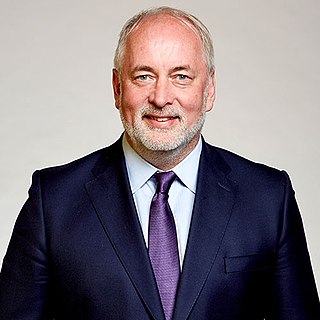Related Research Articles

John Sibthorp was an English botanist.

The Department of Physics and Astronomy at the University of Manchester is one of the largest and most active physics departments in the UK, taking around 330 new undergraduates and 50 postgraduates each year, and employing more than 80 members of academic staff and over 100 research fellows and associates. The department is based on two sites: the Schuster Laboratory on Brunswick Street and the Jodrell Bank Centre for Astrophysics in Cheshire, international headquarters of the Square Kilometre Array (SKA).
Peter John Grubb is a British ecologist and emeritus professor of botany at Cambridge University.
The Montague Burton Professorships of Industrial Relations are three professorships in industrial relations at the University of Cambridge, Cardiff University and the University of Leeds. The professorships were established between 1929–30 and endowed by Sir Montague Maurice Burton, founder of Burton Menswear.

Camden London Borough Council, also known as Camden Council, is the local authority for the London Borough of Camden in Greater London, England. It is a London borough council, one of 32 in London. The council has been under Labour majority control since 2010. The council meets at Camden Town Hall and has its main offices at 5 Pancras Square.

Stuart Graham Cull-Candy is a British neuroscientist. He holds the Gaddum Chair of Pharmacology and a personal Chair in Neuroscience at University College London. He is also a member of the Faculty of 1000 and held a Royal Society - Wolfson Research position.

Colin John Crouch, is an English sociologist and political scientist. He coined the post-democracy concept in 2000 in his book Coping with Post-Democracy. Colin Crouch is currently Emeritus Professor at the University of Warwick and an External Scientific Member of the Max Planck Institute for the Study of Societies.
Donald Andrew Frank Moore Russell, was a British classicist and academic. He was Professor of Classical Literature at the University of Oxford between 1985 and 1988, and a fellow and tutor of classics at St John's College, Oxford, from 1948 to 1988: he was an emeritus professor and emeritus fellow. Russell died in February 2020 at the age of 99.

Nicholas Robert Jennings is a British computer scientist who was appointed Vice-Chancellor and President of Loughborough University in 2021. He was previously the Vice-Provost for Research and Enterprise at Imperial College London, the UK's first Regius Professor of Computer Science, and the inaugural Chief Scientific Adviser to the UK Government on National Security. His research covers the areas of AI, autonomous systems, agent-based computing and cybersecurity.
Stephen Phelps Oakley, FBA is a British classicist and academic. An expert on the work of Livy, he is the ninth Kennedy Professor of Latin at the University of Cambridge and a Fellow of Emmanuel College.

Christopher Jenks is a British sociologist who was Vice-Chancellor of Brunel University from 2006 to 2012.

Neil Burgess is a British neuroscientist. He has been a professor of cognitive neuroscience at University College London since 2004 and a Wellcome Trust Principal Research Fellow since 2011. He has made important contributions to understanding memory and spatial cognition by developing computational models relating behaviour to activity in biological neural networks.

Richard Somerset Houlston is a British medical geneticist. He is a professor of molecular and population genetics at the Institute of Cancer Research in London.
The School of Archaeology is an academic department of the University of Oxford comprising the Institute of Archaeology and the Research Laboratory for Archaeology and the History of Art (RLAHA), and is part of Oxford's Social Sciences Division. The school was created in 2000 when the two existing departments were combined under this umbrella. Both sub-departments retain separate directors, who report to the head of the School of Archaeology, who is replaced every three years.
John Aloysius Mahoney SJ was a Scottish Jesuit, moral theologian, and academic, specialising in applied ethics and business ethics.
Kevin Michael Brindle,, is a British biochemist, currently Professor of Biomedical Magnetic Resonance in the Department of Biochemistry at the University of Cambridge and a Senior Group Leader at Cancer Research UK. He is known for developing magnetic resonance imaging (MRI) techniques for use in cell biochemistry and new imaging methods for early detection, monitoring, and treatment of cancer.
References
- 1 2 3 4 5 6 "https://www.bps.ac.uk/about/who-we-are/honorary-fellows-directory/professor-arthur-weston/01ff56b2-d7f6-e311-88a7-001dd8b721a7"
- ↑ "Professor Arthur Weston | The Academy of Medical Sciences". acmedsci.ac.uk. Retrieved 2022-10-17.
- ↑ "Weston, Prof. Arthur Henry, (born 31 May 1944), Leech Professor of Pharmacology, University of Manchester, 1990–2011, now Emeritus". WHO'S WHO & WHO WAS WHO. 2007. doi:10.1093/ww/9780199540884.013.U43701. ISBN 978-0-19-954088-4 . Retrieved 2022-12-02.
- ↑ "Weston, Prof. Arthur Henry, (born 31 May 1944), Leech Professor of Pharmacology, University of Manchester, 1990–2011, now Emeritus". WHO'S WHO & WHO WAS WHO. 2007. doi:10.1093/ww/9780199540884.013.U43701. ISBN 978-0-19-954088-4 . Retrieved 2022-12-02.
- ↑ "Weston, Prof. Arthur Henry, (born 31 May 1944), Leech Professor of Pharmacology, University of Manchester, 1990–2011, now Emeritus". WHO'S WHO & WHO WAS WHO. 2007. doi:10.1093/ww/9780199540884.013.U43701. ISBN 978-0-19-954088-4 . Retrieved 2022-12-02.
- ↑ "Weston, Prof. Arthur Henry, (born 31 May 1944), Leech Professor of Pharmacology, University of Manchester, 1990–2011, now Emeritus". WHO'S WHO & WHO WAS WHO. 2007. doi:10.1093/ww/9780199540884.013.U43701. ISBN 978-0-19-954088-4 . Retrieved 2022-12-02.
- ↑ "Weston, Prof. Arthur Henry, (born 31 May 1944), Leech Professor of Pharmacology, University of Manchester, 1990–2011, now Emeritus". WHO'S WHO & WHO WAS WHO. 2007. doi:10.1093/ww/9780199540884.013.U43701. ISBN 978-0-19-954088-4 . Retrieved 2022-12-02.
- ↑ Duty, Susan; Weston, Arthur H. (1990-12-01). "Potassium Channel Openers". Drugs. 40 (6): 785–791. doi:10.2165/00003495-199040060-00002. ISSN 1179-1950. PMID 2078995. S2CID 46956574.
- ↑ Busse, Rudi; Edwards, Gillian; Félétou, Michel; Fleming, Ingrid; Vanhoutte, Paul M.; Weston, Arthur H. (2002-08-01). "EDHF: bringing the concepts together". Trends in Pharmacological Sciences. 23 (8): 374–380. doi:10.1016/S0165-6147(02)02050-3. ISSN 0165-6147. PMID 12377579.
- ↑ Weston, A. H.; Geraghty, A.; Egner, I.; Edwards, G. (September 2011). "The vascular extracellular calcium-sensing receptor: an update: Ca2+-sensing in the vasculature". Acta Physiologica. 203 (1): 127–137. doi:10.1111/j.1748-1716.2010.02249.x. PMID 21199402. S2CID 43461632.
- ↑ "Professor Arthur Weston | The Academy of Medical Sciences". acmedsci.ac.uk. Retrieved 2022-10-19.
- ↑ British Pharmacological Society. "Professor Arthur Weston FMedSci DSc".
- ↑ British Pharmacological Society. "Gaddum International Lecture Past winners".
- ↑ "EPHAR - The Federation of European Pharmacological Societies". www.ephar.org. Retrieved 2022-10-19.
- ↑ "Weston, Prof. Arthur Henry, (born 31 May 1944), Leech Professor of Pharmacology, University of Manchester, 1990–2011, now Emeritus". WHO'S WHO & WHO WAS WHO. 2007. doi:10.1093/ww/9780199540884.013.U43701. ISBN 978-0-19-954088-4 . Retrieved 2022-12-02.
- ↑ "View the Royal Horticultural Society's plant trials and awards / RHS Gardening". www.rhs.org.uk. Retrieved 2022-10-19.